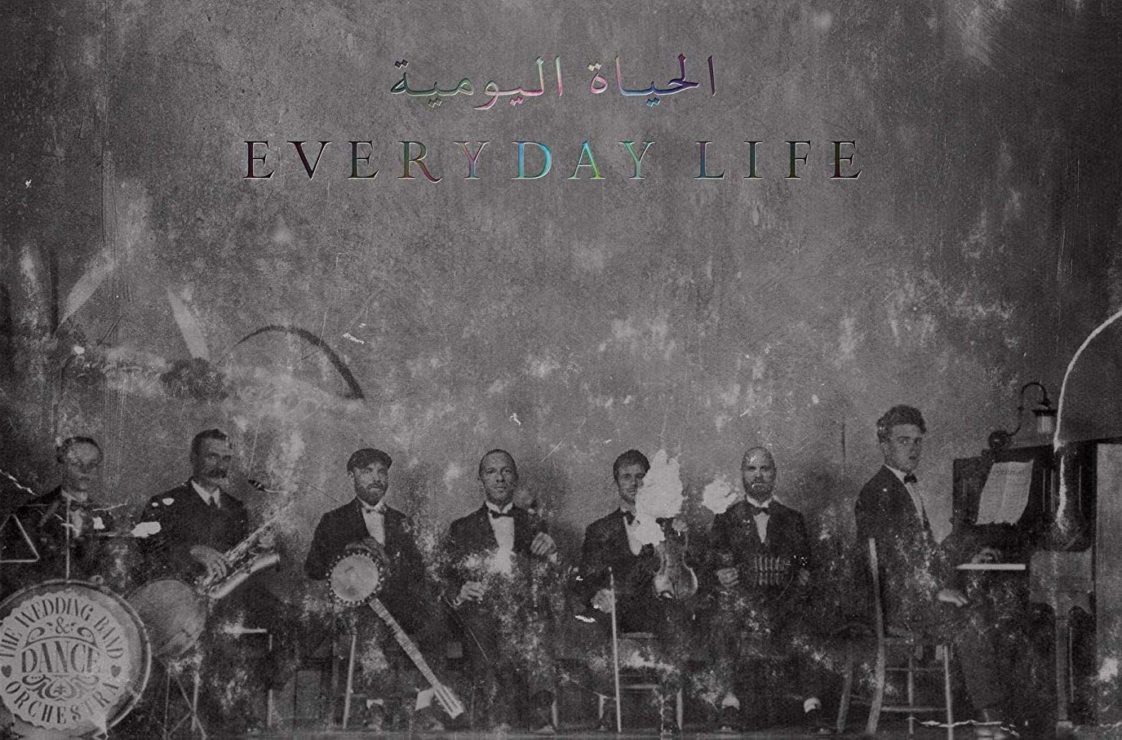
The 2010s were, creatively, anything but spectacular for Coldplay, despite the millions of albums they sold and the dozens of top 40 singles they released. Their 2011 album, Mylo Xyloto — a thematic rock opera concept album, —is noisy and instrumentally overproduced. The 2014 follow up, Ghost Stories — an album inspired by the divorce of Chris Martin, Coldplay’s lead singer, and Gwyneth Paltrow — is a dreamy tale of separation and fond memories but also a musical bore. A Head Full of Dreams, released in 2015, has a vibrant and poppy sound palate, charming at first but burdensome by the end.
Everyday Life, however, does anything but chase popular musical trends. Released a mere month after it was announced this October, the album is 53 minutes long, divided into “Sunrise” and “Sunset, ” and represents Coldplay’s earnest effort to diversify their sound.
“Sunrise” and “Church,” the opening songs in the “Sunrise” section, compliment each other and act as one cohesive song due to how well the former’s effective and beautiful strings arrangement transitions to the latter’s band-driven, ambient, Arabic-influenced tones and vague lyrics about seeking God.
Religion-influenced music is prevalent in songs like “BrokEn,” a piano-driven, by-the-book African American gospel choir song, and “When I need a friend,” another traditional-sounding cathedral choir song that ended the “Sunrise” section. The album gets more emotional with “Daddy,” a beautiful piano ballad about longing for absent fathers to return — certainly the album’s primary tear-jerking moment. The next song, “WOTW/POTP,” is a simple song that portrays people’s determination to make a difference in spite of adversity, despite its incomplete lyrics.
Everyday Life is the first album by Coldplay with a “parental advisory” tag. “Trouble in Town,” a song about how people want to live a normal life without being discriminated against because of their religion and/or race, starts slow and peaceful, but then evolves into an instrumental crescendo which incorporates a sample of an expletive-filled exchange between a U.S. police officer and a person of colour. “Arabesque,” the album’s highlight in my opinion, features African-style music and includes three generations of Kuti family — Femi and his band plays horns, Omorinmade plays the Alto Sax, and Fela’s voice from “Music is the Weapon” sampled in before the climax of the track. At the song’s climax, Martin screams “same fucking blood” twice, but it is drowned out by the vibrant sonic wave.
“Guns,” the opening track for “Sunset” portion of the album, is a fast-paced guitar folk song that not only critiques the state and effects of American gun culture but also the general lack of empathy prevalent in the world, stating,“everyone’s gone fucking crazy/maybe I’m crazy too.”
“Orphans,” the lead single of this album, also focuses on current issues. The pop-infused rock song describes the experience of a girl and her father, whose home was bombed during the Syrian Civil War. Playful tunes and meaningful lyrics aside, the chorus drives home the sentiment that the father and the girl wish that they could return to their lives before the war.
As the album nears its end, “Bani Adam” (“Children of Adam” in Arabic) provides a weird mix of piano that transitions to a Persian poem recitation backed up by band instrumentation — perhaps as a way to showcase the notion of ‘humanity as one’ despite our differences. It then transitions to a sample of a Nigerian gospel song “Otuto Nke Chukwu N’ojija Aha Ya.” This provides a transition for the second-to-last song of the album “Champion of the World,” an uplifting, powerful, arena rock song that pays tribute to the late Scott Hutchinson’s song “Los Angeles, Be Kind” through its guitar riff.
The album concludes with its namesake song, “Everyday Life,” a slow piano- and string-driven rock ballad with a slew of messages about the hardship, uncertainty, and triumphs and tribulations of everyday life, that despite its imperfection we all still have to live it to our best — a fitting, calming closer to this wild and diverse album.
As a double album, Everyday Life amply expresses the band’s thoughts and feelings on the past four years. Although “Eko” (Coldplay’s serene take on Africa and its people), “Cry Cry Cry” (a sweet piano pop song about how it’s okay to cry), and “Old Friends” (about a long-deceased friend who once saved your life) from “Sunset” provide beautiful and well-arranged melodies, they all feel undercooked and leave much to be desired. Nonetheless, Everyday Life certainly shows that Coldplay is willing to change their sound for the better, and it should be welcomed.
Score: 7.4/10
Favourites: Sunrise-Church, Trouble in Town, Daddy, Arabesque, When I Need a Friend, Guns, Orphans, Champion of the World, Everyday Life, Flags
Room for Improvement: BrokEn, WOTW/POTP, Eko, Cry Cry Cry, Old Friends, Bani Adam







